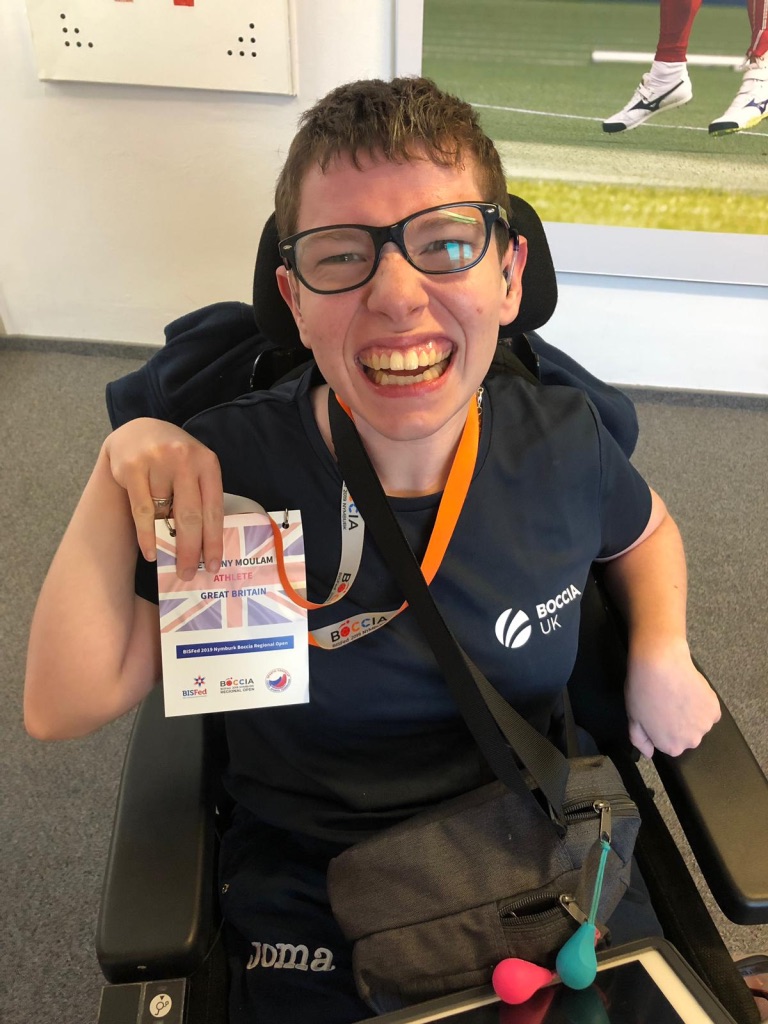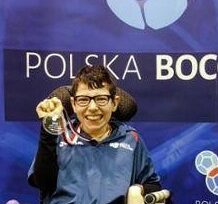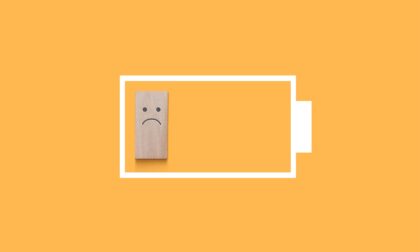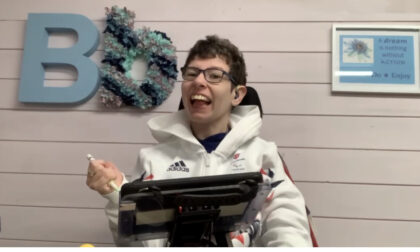 My disability does not define me, however, it definitely defines how some people see me. Just like others I am successfully navigating my life, striving to achieve the best I can. Others may see me as having cerebral palsy, using a power chair, needing an electronic communication aid, wearing hearing aids and always having a personal assistant around.
My disability does not define me, however, it definitely defines how some people see me. Just like others I am successfully navigating my life, striving to achieve the best I can. Others may see me as having cerebral palsy, using a power chair, needing an electronic communication aid, wearing hearing aids and always having a personal assistant around.
The alternative vision is the reality. I am in my final year at university studying for a degree in Social Policy. I’m an elite athlete who was likely to have been going to Tokyo 2020, and hopefully I will be selected for the rescheduled Paralympics in 2021. I have written and led workshops, created and delivered presentations around the world and mentored others who use augmentative and alternative communication (AAC).
For me life is full of adventure, everything is possible. If I want to achieve ‘it’ then there will be a way to do it, it might take longer, and I might need an extra pair of hands for some tasks where mine don’t function well enough, but if determination and hard work are needed, then I’m there.
Achieving in life does sometimes mean making sacrifices. I’ve learned the hard way that I cannot do everything, especially all at once. There is only so much my body can take, I am fit and strong but still need to look after myself, my enthusiasm and commitment means in any day I can charge ahead full on, fire into working on adrenalin and suddenly be running on fumes and collapse as if someone has turned out the lights. The way I manage is to segment my life and do things over a longer time frame, I’ve spread my degree over 7 years instead of 4 and I’ve just had a leave of absence from University to concentrate on my sports career. It’s one or the other, not both. In whatever scenario I need to plan effective recovery time, and fitting in a social life, so I have the energy for the things that matter.
Some disabled athletes are as strong as their able bodied peers. Others like me can be fit and healthy but just not have the energy reserves due to their condition to burn the candle at both ends. I have associated with my cerebral palsy 4 different impairments. Each in its own right would cause some challenges, the 4 together make my life interesting for the most part.
I’d like to expand on this a little. These are purely my personal challenges, other people with Cerebral Palsy might also have dystonia (also known as athetosis), or spasticity or ataxic CP, and the level of challenge for them will vary. Equally they may have similar but not quite the same experiences. The one thing I observe is that CP is a spectrum condition, imagine a DJ’s sound control board, CP can affect many different functions and each lever or knob can be dialled up or tuned down making every person a unique individual.
When I was just 4 months I was diagnosed with athetoid cerebral palsy affecting all 4 limbs. Later when I was 16 and having problems my diagnosis was changed to dystonic cerebral palsy, but essentially they are the same. The constant uncontrolled movements never cease except when I’m in the bath or laid in bed, in both cases when I am fully relaxed, hydrotherapy was great when I was younger but difficult to get. My movements get bigger and more visible when triggered by being physically exhausted, over tired, stressed or in pain, manging this is a whole different story. Basically I need 24 hour support to live my life independently, I know what I want to do, I can do some of it myself but if I want a quality of life then I have learned to accept help (another story). From waking to going to bed I’m using more energy than most other people, for things they might take for granted. I have to consciously think about my speech, making my arm and hand move to pick up a cup, moving from a chair to my walking frame.
Where I can I conserve my energy for the things I want to do. At school I was expected to push myself to the limit, to feed myself, to undertake as many tasks as I could. I was frequently ill, always exhausted and could not put on weight. I got to 18 and put my foot down! I’d met plenty of adults with CP by that time and knew there was a better way, Mum often fed me in school holidays for speed if we were busy and I enjoyed my food so much more when it was warm. I told Mum in the October half term I was no longer going to feed myself at boarding school, she persuaded me we needed to approach it in a staged way so they could see the benefits. I returned to school saying because I had been off most of the previous half term I needed help to get back my strength and would they help by feeding me. Over the next 2 months my life changed, I put on weight, I enjoyed eating, I no longer felt tired, I had energy to do more including at the end of the day. The list of benefits went on for 2 typed pages. By December the staff at school were saying ‘just think you can feed yourself again soon’ and I was thinking no way!! In the Christmas holiday we saw my paediatrician who was delighted, she looked at my list of benefits and agreed that it was my choice, and clearly an excellent one as I had put on so much weight. She wrote to school and told them that it was essential they continued to feed me. The result has been that my life changed, by choosing to have help then I can live my life to the fullest, and it’s not just eating it’s having help in all aspects of daily living such as dressing and care. Even today if I get myself dressed (loose, easy to put on clothes and no bra!) and take myself to the loo it takes well over an hour. If I then feed myself breakfast which is prepared for me (another hour) suddenly the morning is nearly gone and I’m exhausted. A quick rest doesn’t help, once the energy is gone for the day it’s gone, this means working hard to conserve myself for what is important.
My dysarthria means my eating and drinking is affected, as well as my speech. Dysarthria is muscle weakness in and around the mouth, including the tongue, this means my speech can be slurred, sound choppy, come out in a burst or seem slow and deliberate. Also it means despite my best efforts it can sometimes sound like a whisper and sometimes be overly strong and powerful meaning everyone in a sports hall can hear me. When I force my speech to be as clear as possible, such as when I have a new member of my team, and do this over a prolonged period, then I over use my vocal cords. Because of problems when I first started at university I had to have a lot of tests, I had strained my throat muscles and as a result I now know when I start to go hoarse I need to only use my communication aid whilst I recover. Even without this, on a daily basis, when I am tired my speech becomes more effortful and much less clear, and I know both my team and my parents also find it harder to understand me when they too are tired. I’ve had an electronic communication aid since I was 4, compared to many people I am understood by people who know me when the conversation is contextual. This means with people who don’t know me well I use my communication aid as my primary means of interaction, but in groups where I am known I rely on my team to support my speech spontaneity by repeating what I say so I can respond in real time. Communication is the subject of another post.
My speech is also closely linked to my hearing impairment. I am unable to hear high frequency sounds, in speech these are the fricatives ‘f’, ‘s’, ‘v’, ‘th’ sounds, but this correlates to my challenge in pronouncing these sounds. I also have a generalised hearing loss, this means I do not hear quieter sounds, or find it hard when there is background noise, often other people have this type of challenge if they go to a concert and cannot hear what a companion says to them. I didn’t get my first hearing aids until I was 10, because there were none available until then that could amplify only the bits I need to hear. The result is I have been a lip reader as long as I can remember. Wearing hearing aids means I have to concentrate really hard on what is being said, and to filter out background, but to help my understanding I also lip read in every situation. Concentrating like this is really tiring, and at times I take my hearing aids out to give my brain a rest. The other thing, which I believe is related to my hearing, is that I have never developed an inner voice, everything I ‘hear’ in my head is in a visual format.
The brain is an amazing organ, when damaged it works out alternative ways to carry out essential functions. This plasticity means that my brain has found different ways to work. When I started at university my speech and language therapist introduced me to a condition called ‘Synaesthesia’, as I discovered what this was I cried, it is me to a T. I use colours and pictures/visuals for everything, my inner voice is all visual, like a technicolour reel whizzing along, there are no words or sounds. For the first time I could explain and understand why my brain does not work like that of most other people, it explained why I learn differently to others, why things at school did not always make sense, and why coming to terms with my brain damage has improved my learning no end. Now I know why it takes me so much longer to do my work, it’s not just the physical side of things, the effort of speaking so my assistant can scribe, the intense focus on listening but it’s also that I need to translate everything I hear into my own ‘language’ of colour, visual images, pictures and symbols so I can process it, store it, retrieve it and translate it back to an output my work and every day communication.
I’ve never known life without cerebral palsy, what I do every day is my norm. I don’t know what it’s like to have boundless energy, but what I do know what it is like when I have enough energy, and that I have a zest for life. My CP has opened doors to many opportunities I might not have had. I’m competitive, determined and enthusiastic, occasionally I have a blip and wonder if I’m good enough, but who doesn’t? But overall my approach to life is everything is possible, we will find a way.





If you found this interesting or
helpful please feel free to share.